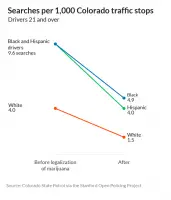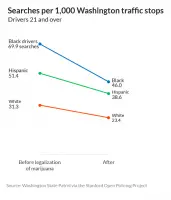
The legalization of marijuana in Washington state and Colorado had at least one unanticipated effect on the streets: a sharp decline in the number of traffic stops and searches by state police, a new analysis shows.
The drop means fewer interactions between police and drivers, potentially limiting dangerous clashes. But even though the number of traffic stops fell significantly for all racial groups, black and Hispanic drivers are still searched at higher rates than white motorists, the analysis found.
Reveal from The Center for Investigative Reporting in partnership with The Marshall Project reviewed stop and searches conducted by Washington and Colorado state patrols before and after marijuana became legal in both states in late 2012. The analysis was based on data obtained by researchers at Stanford University who released a report this week studying 60 million state patrol stops in 31 states between 2011 and 2015, the most comprehensive look at national traffic stops to date.
The data does not offer a complete picture because it includes only stops by state patrol agencies and not local law enforcement. For instance, in Washington and Colorado, the data would not include stops made by local police in Seattle or Denver, where African American residents are concentrated in those states.
It is possible that pot legalization has not had the same effect on urban traffic stops as it has on those made by highway patrols because policing strategies differ, said Charles Epp, a University of Kansas professor who co-authored the 2014 book “Pulled Over: How Police Stops Define Race and Citizenship.” State police tend to focus on accidents, impaired and reckless driving, and the transport of illegal drugs. City police concentrate on crime deterrence and response.

“What’s the reason that you pulled us over, officer?” he asked.
A white officer unbuckled Brown’s seatbelt, pulled him out of the car and forced him onto the snow face down with the officer’s hand pushing down on Brown’s head, the video shows. The last images of Brown’s video show the officer slapping at the phone in Brown’s hand, ending the recording.
The police department has maintained that it did nothing wrong.
“If they see you and they’re racially profiling, that happens. I don’t think weed has anything to do with it,” said Brown, 33.
According to court papers, the officer pulled over Brown’s car because he believed he had seen it hours earlier driving slowly through a “high crime area” where “lots of drugs (were) being sold.” No drugs were found in the car, and the Brown brothers have said they were home at the time.
The explanation demonstrates what traffic stops represent to many officers: the means to search for evidence of more serious crimes such as illegal drugs or weapons. “It’s like the triple-word score in emphasis for police,” said Steven Bender, an associate dean at the Seattle University School of Law who has researched links between race and marijuana regulation and legalization.
The Stanford study suggests that removing marijuana possession from the potential list of crimes lowers the chance that a car will be stopped and searched.
And the numbers are striking.
In Washington, the search rate of black drivers age 21 and over decreased by about 34 percent after legalization, according to the analysis by Reveal and The Marshall Project. Search rates of white and Hispanic drivers in the same age group declined by about 25 percent.

In Colorado, the search rate of African American drivers 21 and over dropped by nearly half, while the search rate of Hispanic drivers fell by 58 percent. White drivers faced almost two-thirds fewer searches after recreational marijuana was legalized.
Racial disparities, however, also persisted in Colorado even as overall numbers of searches went down. After legalization in Colorado, the search rate for African American drivers was 3.3 times that of white drivers, and the rate for Hispanics was more than 2.7 times that of whites.
The findings on stop and searches are similar to those showing a decrease in the number of marijuana arrests in Colorado after legalization, according to a 2016 Colorado Department of Public Safety report that reviewed legalization’s wide-ranging impacts. The study showed that the total number of marijuana arrests dropped by nearly half after legalization, but the marijuana arrest rate for African Americans was almost three times that of whites.
The Colorado and Washington state patrols were provided with findings of the analysis but did not respond to requests for comment.
“Legalizing marijuana is not going to solve racial disparities,” said Mark Silverstein, legal director of the American Civil Liberties Union of Colorado. “We need to do a lot more before we get at that.”
The ACLU has advocated requiring law enforcement agencies to have “objective facts” that amount to reasonable suspicion before asking a driver for consent to search a car, Silverstein said. In 2010, Colorado passed a law requiring officers to tell drivers that consent is voluntary.
![]() —Reveal from The Center for Investigative Reporting.
—Reveal from The Center for Investigative Reporting.
![]()
This story was originally published by Reveal from The Center for Investigative Reporting, a nonprofit news organization based in the San Francisco Bay Area. Learn more at revealnews.org and subscribe to the Reveal podcast, produced with PRX, at revealnews.org/podcast. This investigation was published in partnership with The Marshall Project, a nonprofit news organization covering the U.S. criminal justice system. Sign up for their newsletter, or follow The Marshall Project on Facebook or Twitter.





























RigidPrinciples says
It’s nice to be politically correct and all, but this is 2017, where we all have the internet. The War on Marijuana is and has always (especially in its genesis) been a war on black and hispanic people. And the government, at all levels, has lost that war (quite miserably at that). Furthermore, we *all* know that medical marijuana is simply a stepping stone towards complete marijuana legalization, which is gone through simply to help the government save face concerning their loss in this war. The best part about marijuana legalization at the state level is it teaches the children to not to respect unconstitutional federal legislation. This generation of children will have a deeply instilled value to stand up to the federal government when they attempt to infringe on our rights. What a bonus! For some background, in early August of 1937, Harry Anslinger stood before congress, and stated “We need to do something about the big lipped coloreds who are seducing our white women with their jazz and marihuana (sp)”. In late August of 1937, congress passed the “Marihuana Tax Act of 1937” (later found to be unconstitutional..thanks Leary!). This built upon the earlier precedent decided due to the results of alcohol prohibition. After alcohol prohibition was passed, the People stood up to the tyrants, and used machine guns to defend their individual, inherent rights. The topmost right being the right to own their own bodies, meaning the People have full and complete jurisdiction over their bodies. Our bodies are our own sovereign nations. The government does not get the privilege to legislate what we can, or can’t, put in, or take out of our own bodies. Because we own our own bodies (if you don’t have this belief you should brag about it every chance you get!). While it is flattering that the government would like to protect us from ourselves, the bottom line is they do not have that privilege. Anyways, so in the early 1930’s, the government realized if they were to infringe on our rights again, they would need to first disarm the public as much as possible. The government knew we had a second amendment, so they knew they could not make machine guns illegal. However, the wording of the 16th amendment gave the government the impression they could tax anything they would like, including rights. So in the early 1930’s, congress passed legislation requiring folks to first possess a congressional tax stamp before one could purchase a machine gun. And congress was in charge of printing and doling out the stamps…which they printed few of. But this is the precedent that was used to justify marijuana prohibition. After congress passed the Marihuana Tax Act of 1937, they simply didn’t print any tax stamps at all. This jedi mind trickery isn’t even really that cunning. However, in 1937, there was no easier way to bring together a bunch of rich, fat, white guys, other than a cause of racism. The last thing these rich, white, neglectful husbands wanted was for their white women to be gallivanting around dancing to jazz music and smoking weed with black guys and their larger packages while their husbands were at work. And here we are today…with the majority of the marijuana offenders incarcerated being black…with the law functioning exactly as it was originally intended. I really wish at least one person was able to publicly ask Obama during his presidency if the reason he supported continued prohibition was the same reason Harry Anslinger caused it to become illegal in the first place.
wishful thinking says
Unfortunately I believe that the decision of decriminalizing marijuana use in Flagler County depends on Craig Coffey since he runs the whole show in town. – at least until Floriduh joins the 21st century and legalizes personal pot use just as sane states have done ,and are doing.
Oh yes can’t forget the sheriff – gotta make sure the overpriced jail doesn’t become a ghost town……
Outsider says
Ah, but the article leaves out one important fact, intentionally I suspect: accidents in states where marijuana is legal have increased 3%, with marijuana increasingly being found in those involved in accidents. While I do believe wasting money on arresting and jailing stoned people is ridiculous, I find it pretty sad that the majority of people are cheering on the legalization of yet another mind numbing substance and the fact that it will become easier for our kids to get stoned. I teach my kids that while maybe “everyone” is doing it, it will do absolutely nothing to advance your future prospects in life, pointing out that there are no ribbons or trophies or newspaper coverage for getting high. I don’t know how long it will last, but they are doing pretty darn good in activities that will help them get somewhere in life….like out of our basement before thirty, for example.
http://www.cbsnews.com/news/legal-pot-and-car-crashes-yes-theres-a-link/
gmath55 says
After states legalized medical marijuana, traffic deaths fell. Legalization of medical marijuana is not linked with increased traffic fatalities, a new study finds. In some states, in fact, the number of people killed in traffic accidents dropped after medical marijuana laws were enacted.
“Instead of seeing an increase in fatalities, we saw a reduction, which was totally unexpected,” said Julian Santaella-Tenorio, the study’s lead author and a doctoral student at Columbia University’s Mailman School of Public Health in New York City.
http://www.reuters.com/article/us-health-marijuana-traffic-death-idUSKBN14H1LQ
Outsider says
Your article addresses medical marijuana. My article discusses recreational use, which would legalize it for a much broader swath of the population, for unnecessary reasons. We all understand that medical legalization will ultimately lead to recreational legalization.